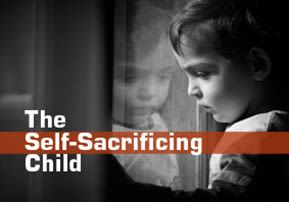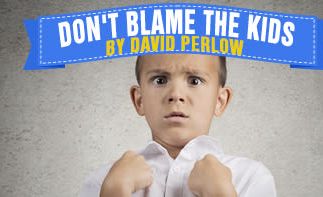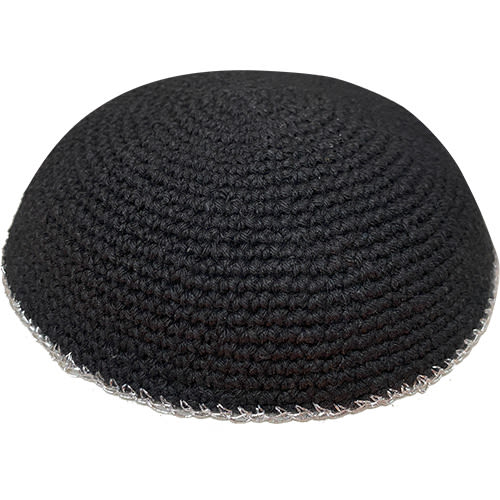
The Self-Sacrificing Child
Many problematic children sacrifice themselves to keep the family together. They don't hurt themselves just to fight with their parents or to be difficult...

Suppose you’re a parent with a disrespectful, disruptive child: a child who’s acting out, and child who’s going off the path of religious observance, G-d forbid. The normal, natural, initial response for a parent is to ask: “What’s going on here? How on earth can this be good?” That’s actually not a bad starting point, but we need to take it up a level, and start asking ourselves more questions: “Why is this happening? What’s the message? How can I relate to this in a productive way?”
Here’s one idea of what may be going on under the surface of your out-of-control child: Kids are the purest beings on the planet (and we were that way too, when we were kids.) All kids have the intention, deep down, to be helpful to their parents. If that kid is misbehaving, or acting out, or going away from Judaism, in a certain sense, it means they’ve taken control of the family. Yes, it’s unhealthy control, but all children need connection, and attention and parents, and they will do whatever they can to get it. If the child’s parents are struggling, and the family unit is starting to break apart; that kid doesn’t want to have a divorce in the family, G-d forbid. If the  only way he can keep his family intact is by creating an emergency situation, or ‘shock’, then that’s what he’s going to do.
only way he can keep his family intact is by creating an emergency situation, or ‘shock’, then that’s what he’s going to do.
Maybe this sounds shocking, but in the more than 30-something years that I’ve been a therapist, I’ve never seen a divorce in a family where a kid was suicidal, anorexic, or self-mutilating.
In a very profound sense, the child is sacrificing himself to keep the family together. Children aren’t hurting themselves just to fight with their parents, or to be difficult. Deep down, that child’s heart yearns to be a healthy member of their family unit – but the family unit itself is in danger of disappearing. Once we have that perspective, we can clearly see that the real problem doesn’t lie in the kid, it’s rooted in the parents. A related point to make here is that if a parent wants their kids to have values that they themselves don’t have, then they don’t have the ‘blueprint’ or map that the child will need to follow, to get to where the parent is aspiring for them to go. If I still have a very short fuse, I can’t expect my child to be a patient saint who never gets angry…
So we have to start with ourselves, and we have to try and inspire our children with our own behavior – and this is especially true if we have a ‘difficult’ kid. We have to say to ourselves that no matter what, I am going to give this child whatever he needs, whenever he needs it. No matter what, I am going to drop everything to do that.
When the parent makes that decision and stands behind it, even when it requires a lot of parental self-sacrifice, it means the parents are acting as ‘leaders’ of their families, and they are creating the right environment to motivate their children. When parents act like inspiring leaders, they give their kids direction in life, and they help their families to get to where they want to go. Punishments and indifference simply won’t do the job, long term. If we want our kids to be healthy, spiritually well-adjusted, happy adults, we need to lead them to that place; we need to make whatever changes in ourselves are required for the family to get there; and if we’re forced to choose between giving the kids ‘too much’ or giving them ‘too little’ – let’s err on the side of caution, and treat them with as much generosity and kindness as we can! In the long term, it can only give them a tremendous boost, and help them to feel loved and significant.
Our kids are us
We can only chart a course for where we need to get to, if we know where we’re starting out from. So let’s be honest, and take stock in ourselves. Don’t shy away from it, or get scared about what you might discover. Everything is reversible, everything is fixable. G-d is beyond science and stats. Put the past behind you, and go for it! You can change things right now, and get them moving in the direction you really want your family to be heading towards.
Kids are young and impressionable. You can start influencing them right now, even if they aren’t cooperating with you. How? It’s very simple: just act the way you want them to act. They’ll watch you and listen to you, and eventually, they’ll follow you. Why? Because they don’t want to lose their grounding, and you, their parent, are the earth on which your kids stand. All of us have a basic human need to be given love and attention. If your kid can’t get that from you in a healthy way, he’s going to find another way to do it. That ‘other way’ might not be pleasant, but accept it, and work with it. Once we accept that pain with love, we can transform our relationship with ourselves, and with others.












5/16/2013
since we are all children of HaShem, I wonder…. Given the premise that we are all children of HaShem, I wonder if this article can be read in a way that gain insight as to how HaShem parents and better understand our (The Jewish people's) collective relationship to our loving parent in Heaven. Jewish adults are the 'children' and HaShem is the parent. Sometimes when I read 'The Garden of Education' I read it with a lens to understand how G-d parents. It gives me hope because as loving and kind as Rav Shalom is, HaShem is more loving.
5/16/2013
Given the premise that we are all children of HaShem, I wonder if this article can be read in a way that gain insight as to how HaShem parents and better understand our (The Jewish people's) collective relationship to our loving parent in Heaven. Jewish adults are the 'children' and HaShem is the parent. Sometimes when I read 'The Garden of Education' I read it with a lens to understand how G-d parents. It gives me hope because as loving and kind as Rav Shalom is, HaShem is more loving.